Winnsboro, TX: This is a farmer’s market town. It is a place to get away, whether to join a retirement community or as a second home for those looking to escape the Big City headaches of Dallas-Ft. Worth. The proximity to the city has transplanted tasty treats in the form of restaurants—and at the local Farmer’s Market!
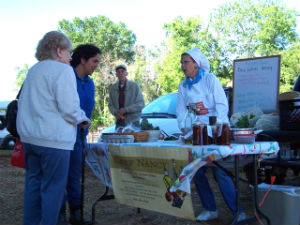
The Falsters participate in their local farmer’s market selling breads, vegetables, salsa, chutney, honey, and jams. Nancy answers questions one by one, encouraging the customers to eat whole foods and to eat locally, just as she has done with us here at Pantry Paratus in other blogs.
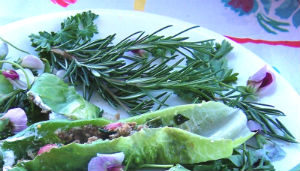
Life on the farm is a busy one; there are the farmer’s market board meetings, an active church life, the responsibilities of being a WAPF chapter leader, some local political activism, the special meals that Nancy provides as a private chef and the typical daily life of a ranch too! Whew, the list alone makes me tired!
They raise horses, cattle for beef and raw milk, goats for meat and raw milk, chickens (and other poultry) for eggs and meat, dog and cat for security, oh yes, and rabbits for fun!
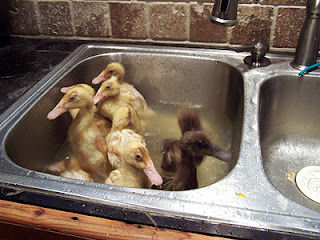
Chef Nancy tells me that nothing on the farm ever gets wasted—there are times when a kitchen experiment or excess milk gets fed to the chickens. Capturing “wasted items” from one stream as inputs into another stream is a great practice that any farmer, homesteader or gardener can benefit from; besides, who does not like delicious farm fresh eggs?
For the most part, the animals graze together.
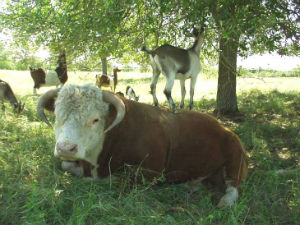
Polyspeciation is not just a method for land use efficiency. This allows the chickens to scratch through manure to keep the fly population to a minimum while scratching the manure into the soil to increase its’ fertility. It allows animals to pick and choose what they will eat, as the others will follow behind and eat the rest! Pasturing multiple breeds on the same land also improves the health of the animals; a certain mite or parasite that thrives only on one animal cannot adjust to a rotation, eliminating “plagues” that so often hit monoculture farms.
The Falsters try to keep the farm self-sustaining, and estimate that they accomplish this about 75% of the time. There are times however, like when the drought that hit Texas this past year threatened their grass-fed beef herd requiring the Falsters to get creative. It is this type of creativity—along with the passion for their mini Herefords—that landed the Falsters on the front cover of Acres USA just this past year.
Click here to read the story in Acres USA
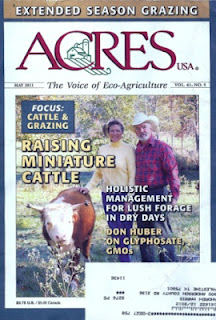
Keep it up, Falster Farms…we need more farms like yours.
–Chaya
If you live near Winnsboro and would like to learn more about their clover-finished beef, Nancy’s chef services, or would like to contact Karl for consulting in regards to your farm or ranch, please contact them through www.falsterfarm.com.
Would you like to read more about Chef Nancy Falster? She is a regular guest contributor for Pantry Paratus.
Check out these other blogs:
Meet Chef Nancy
Chef Nancy: Low-cost Menu Planning
Photos:
Nancy at the Farmer’s Market, and her lovely food: http://www.winnsborofarmersmarket.com/index.php
Ducks, crazy goats, and more can be found on their website: http://www.falsterfarm.com/
Even More Reading:
I liked this article in their local paper: http://winnsborotoday.com/articles/New%20Breed%20of%20Texas%20Ranchers.htm
